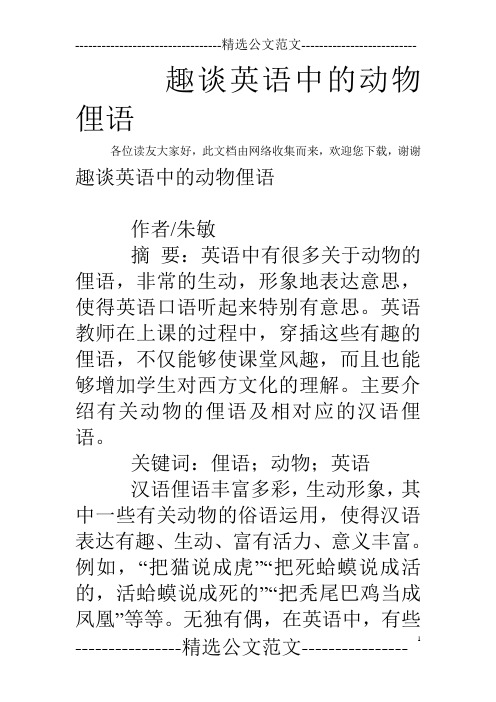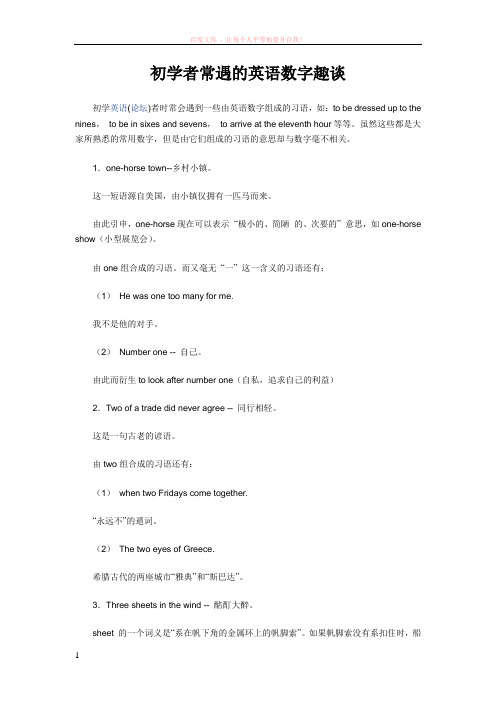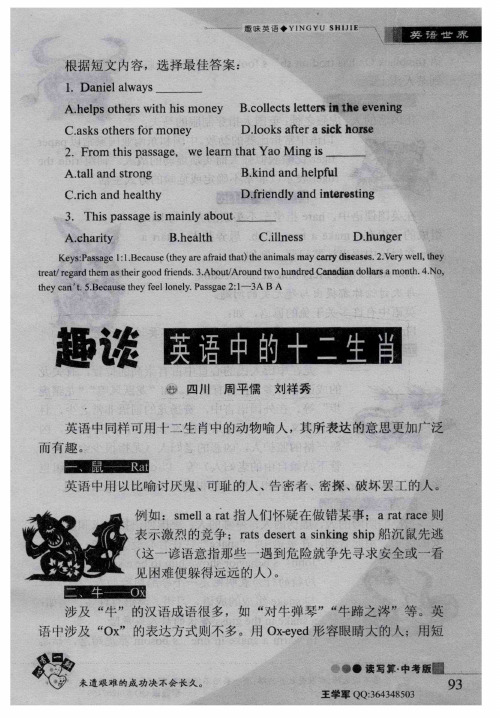趣谈英语中的比喻(一)
- 格式:docx
- 大小:13.01 KB
- 文档页数:2



趣谈英语中的动物俚语各位读友大家好,此文档由网络收集而来,欢迎您下载,谢谢趣谈英语中的动物俚语作者/朱敏摘要:英语中有很多关于动物的俚语,非常的生动,形象地表达意思,使得英语口语听起来特别有意思。
英语教师在上课的过程中,穿插这些有趣的俚语,不仅能够使课堂风趣,而且也能够增加学生对西方文化的理解。
主要介绍有关动物的俚语及相对应的汉语俚语。
关键词:俚语;动物;英语汉语俚语丰富多彩,生动形象,其中一些有关动物的俗语运用,使得汉语表达有趣、生动、富有活力、意义丰富。
例如,“把猫说成虎”“把死蛤蟆说成活的,活蛤蟆说成死的”“把秃尾巴鸡当成凤凰”等等。
无独有偶,在英语中,有些表达方法也具有类似汉语的效用。
现举几例有趣的动物俚语表达法,希望能对英语英语教师有帮助,使读者在阅读英语原著时更好地理解文章。
Dog汉语中,我们常常会说,“狼心狗肺”“鸡犬不宁”“狐朋狗友”,“狗掀门帘全靠嘴”“狗窝里落不下剩馒头”等。
可见在中国文化中可谓是贬义更浓一些。
而在西方文化中,狗是家中的宠物,可以享受很高的待遇,是人类的好朋友,忠诚而友好,也是人们寄托感情的对象,所以英语中狗则常作褒义多一点。
如,形容一个人很幸运时会说,“You are a lucky dog.”又如,“Love me,love my dog.”,“Every dog has its day.”,“top dog”,a gay dog,work like a dog。
Sheep在我们的眼中,羊是温顺的、优雅的动物。
在中国的生肖文化中,属羊的人高贵迷人,热爱自然,具有艺术气质,个性外柔内刚。
而在英语中则含贬义较多一点。
Sheep作贬义时多指“害羞,扭捏的胆小鬼,愚蠢的人。
”例如,a black sheep,a lost sheep。
Pig在汉语中说到猪,人们就会想到“爱吃、懒惰、愚钝、肮脏。
”等词语。
如,“猪头猪脑”“像猪脑袋一样笨”“死猪不怕开水烫”.可谓是贬义很浓厚。

英语中动物喻人现象趣谈Human beings have long used animals to represent and embody certain characteristics and traits in literature, language, and cultural traditions. From the cunning fox to the wise owl, animals have been used as metaphorical figures to convey a wide range of qualities and traits. In this article, we will take a closer look at the phenomenon of using animals to represent human characteristics in the English language, exploring its history and examples, as well as its cultural and literary significance. So whether you are a fan of the sly fox or the majestic lion, this article is sure to provide an interesting and enlightening look at the enduring practice of using animals to personify human characteristics.1. "The History of Using Animals to Personify Human Traits in English"The use of animals to personify human traits and characteristics has a long and rich history in the English language and literature. One of the earliest examples of this can be found in the ancient Greek epic poems, "The Iliad" and "The Odyssey," in which animals such as lions, wolves, and vultures were used to represent strength, cunning, and perseverance.In medieval literature, animals were often used as allegorical figures to convey moral lessons and religious themes. For example, the fox was often depicted as a symbol of deceit and trickery, while the lion was seen as a symbol of courage and nobility.The use of animal personification also played a significant role in the development of traditional English nursery rhymes and fairy tales, such as "The Tortoise and the Hare," "The Wolf and the Lamb," and "The Fox and the Grapes." These stories often used animals to illustrate various humanqualities and characteristics, such as laziness, greed, and cunning.In modern times, animal personification continues to be a prevalent theme in literature and popular culture, with animals being used to represent everything from strength and bravery to intelligence and wit. Whether in children's stories, folktales, or modern literature, the use of animals topersonify human characteristics remains an enduring and powerful way to convey meaning and impart lessons to readers of all ages.2. "Common Examples of Animal Personification in English"The use of animals to personify human traits and characteristics has a long and rich history in the English language and literature. One of the earliest examples of this can be found in the ancient Greek epic poems, "The Iliad" and "The Odyssey," in which animals such as lions, wolves, and vultures were used to represent strength, cunning, and perseverance.In medieval literature, animals were often used as allegorical figures to convey moral lessons and religious themes. For example, the fox was often depicted as a symbol of deceit and trickery, while the lion was seen as a symbol of courage and nobility.The use of animal personification also played a significant role in the development of traditional English nursery rhymes and fairy tales, such as "The Tortoise and the Hare," "The Wolf and the Lamb," and "The Fox and the Grapes." These stories often used animals to illustrate various humanqualities and characteristics, such as laziness, greed, and cunning.In modern times, animal personification continues to be a prevalent theme in literature and popular culture, with animals being used to represent everything from strength and bravery to intelligence and wit. Whether in children's stories, folktales, or modern literature, the use of animals to personify human characteristics remains an enduring and powerful way to convey meaning and impart lessons to readers of all ages.3. "Cultural and Literary Significance of Animal Personification"The use of animals to personify human traits and characteristics has a long and rich history in the English language and literature. One of the earliest examples of this can be found in the ancient Greek epic poems, "The Iliad" and "The Odyssey," in which animals such as lions, wolves, and vultures were used to represent strength, cunning, and perseverance.In medieval literature, animals were often used as allegorical figures to convey moral lessons and religious themes. For example, the fox was often depicted as a symbol of deceit and trickery, while the lion was seen as a symbol of courage and nobility.The use of animal personification also played a significant role in the development of traditional English nursery rhymes and fairy tales, such as "The Tortoise and the Hare," "The Wolf and the Lamb," and "The Fox and the Grapes." These stories often used animals to illustrate various humanqualities and characteristics, such as laziness, greed, and cunning.In modern times, animal personification continues to be a prevalent theme in literature and popular culture, with animals being used to represent everything from strength and bravery to intelligence and wit. Whether in children's stories, folktales, or modern literature, the use of animals to personify human characteristics remains an enduring and powerful way to convey meaning and impart lessons to readers of all ages.4. "Exploring the Psychological and Sociological Implications of Animal Personification"The use of animals to personify human traits and characteristics has a long and rich history in the English language and literature. One of the earliest examples of this can be found in the ancient Greek epic poems, "The Iliad" and "The Odyssey," in which animals such as lions, wolves, and vultures were used to represent strength, cunning, and perseverance.In medieval literature, animals were often used as allegorical figures to convey moral lessons and religious themes. For example, the fox was often depicted as a symbol of deceit and trickery, while the lion was seen as a symbol of courage and nobility.The use of animal personification also played a significant role in the development of traditional English nursery rhymes and fairy tales, such as "The Tortoise and the Hare," "The Wolf and the Lamb," and "The Fox and the Grapes." These stories often used animals to illustrate various humanqualities and characteristics, such as laziness, greed, and cunning.In modern times, animal personification continues to be a prevalent theme in literature and popular culture, with animals being used to represent everything from strength and bravery to intelligence and wit. Whether in children's stories, folktales, or modern literature, the use of animals to personify human characteristics remains an enduring and powerful way to convey meaning and impart lessons to readers of all ages.5. "The Role of Animal Personification in Mythology and Folklore"The use of animals to personify human traits and characteristics has a long and rich history in the English language and literature. One of the earliest examples of this can be found in the ancient Greek epic poems, "The Iliad" and "The Odyssey," in which animals such as lions, wolves, and vultures were used to represent strength, cunning, and perseverance.In medieval literature, animals were often used as allegorical figures to convey moral lessons and religious themes. For example, the fox was often depicted as a symbol of deceit and trickery, while the lion was seen as a symbol of courage and nobility.The use of animal personification also played a significant role in the development of traditional English nursery rhymes and fairy tales, such as "The Tortoise and the Hare," "The Wolf and the Lamb," and "The Fox and the Grapes." These stories often used animals to illustrate various humanqualities and characteristics, such as laziness, greed, and cunning.In modern times, animal personification continues to be a prevalent theme in literature and popular culture, with animals being used to represent everything from strength and bravery to intelligence and wit. Whether in children's stories, folktales, or modern literature, the use of animals to personify human characteristics remains an enduring and powerful way to convey meaning and impart lessons to readers of all ages.6. "Animal Personification in Modern Times: A Comparative Analysis"The use of animals to personify human traits and characteristics has a long and rich history in the English language and literature. One of the earliest examples of this can be found in the ancient Greek epic poems, "The Iliad" and "The Odyssey," in which animals such as lions, wolves, and vultures were used to represent strength, cunning, and perseverance.In medieval literature, animals were often used as allegorical figures to convey moral lessons and religious themes. For example, the fox was often depicted as a symbol of deceit and trickery, while the lion was seen as a symbol of courage and nobility.The use of animal personification also played a significant role in the development of traditional English nursery rhymes and fairy tales, such as "The Tortoise and the Hare," "The Wolf and the Lamb," and "The Fox and the Grapes." These stories often used animals to illustrate various humanqualities and characteristics, such as laziness, greed, and cunning.In modern times, animal personification continues to be a prevalent theme in literature and popular culture, with animals being used to represent everything from strength and bravery to intelligence and wit. Whether in children's stories, folktales, or modern literature, the use of animals to personify human characteristics remains an enduring and powerful way to convey meaning and impart lessons to readers of all ages.。

初学者常遇的英语数字趣谈初学英语(论坛)者时常会遇到一些由英语数字组成的习语,如:to be dressed up to the nines,to be in sixes and sevens,to arrive at the eleventh hour等等。
虽然这些都是大家所熟悉的常用数字,但是由它们组成的习语的意思却与数字毫不相关。
1.one-horse town--乡村小镇。
这一短语源自美国,由小镇仅拥有一匹马而来。
由此引申,one-horse现在可以表示“极小的、简陋的、次要的”意思,如one-horse show(小型展览会)。
由one组合成的习语。
而又毫无“一”这一含义的习语还有:(1)He was one too many for me.我不是他的对手。
(2)Number one -- 自己。
由此而衍生to look after number one(自私,追求自己的利益)2.Two of a trade did never agree -- 同行相轻。
这是一句古老的谚语。
由two组合成的习语还有:(1)when two Fridays come together.“永远不”的遁词。
(2)The two eyes of Greece.希腊古代的两座城市“雅典”和“斯巴达”。
3.Three sheets in the wind -- 酩酊大醉。
sheet 的一个词义是“系在帆下角的金属环上的帆脚索”。
如果帆脚索没有系扣住时,船帆可以任意随风飘扬。
船员们称之为in the wind。
A sheet in the wind由此成为船员们一句口头语言,表示tipsy(微醉)。
Three sheets in the wind 自然是大醉特醉了。
由three组合成的习语还有:Three score and ten --古稀之年。
score在英语中是“二十”的意思。
尽管这一习语中的数字加起来是七十,但在引喻中只是泛指老年而已。

词汇漫谈
知识拓展安徽省濉溪县百善中学姜经志供稿
在英语中“归西”(go west)有戏剧的意味,指人的时候是表示“死亡”;指物品的时候是指“摧毁”、“损坏”的意思。
至于这个词汇的来源,有许多不同的解释:
“日落西方”表示一天的结束,人们常用“西方”来象征死亡,所以go west 与太阳西沉有关。
其他许多民族都有类似的说法,听说泰国人睡觉时头要朝东方睡,只有尸体的头部才能朝西方停放。
因此go west 也就意味着“死亡”。
另外,古埃及及神话中有一位奥塞利斯,他死了以后成为冥神,统治着尼罗河以西的土地。
因此,西方民族一直沿用“去西方”来表示死亡。
这个用法与中文的“上西天”、“归西”不谋而合。
还有人说,美国本部尚未开发时,那里一片荒凉,野兽出没频繁,去西部的人多半不能活着回来,因此go west 就代表了“死亡”或“没指望”了。
1832年,纳撒尼尔·韦思曾经作了两次西部“日落地区”的探险,结果均告失败,铩羽而归。
而第四种说法则是,在第一次世界大战期间,西线战争最为频繁酷烈,死伤无数。
因此,go west 就意味着命丧黄泉。
这个用法后来也成为军人开玩笑时说的话了。
例句:My old car has gone west.我的老爷车已经报销了。
My new computer has gone west after only three months.我的新电脑只用了三个月就坏了。
. All Rights Reserved.。
小学英语趣味任务连连做(四十三)(任务一)英语趣味谈---英语颜色趣谈(一)红色red1.在英语和汉语中,红色red有时可以完全对应,如:红旗—red flag,红场—the Read Square,红十字会—Red Cross,红葡萄酒—red wine。
Just mentioning his ex-wife's name was like a red rag to a bull. (直译)提他前妻的名字简直就是在公牛面前摆红布。
(实译)一提他前妻的名字他就火冒三丈。
通常,在翻译含有色彩词语的句子时,一些初学者会直译,一不留神,闹出不少笑话,如上句。
结合上面谈到的文化语境,我们知道它包含许多因素。
这里就联系到其中的风俗民情因素。
众所周知,斗牛是西班牙一种传统的民间活动,经久不衰。
在观众济济的开阔场地上,一块红布,在斗牛士左右晃动下,引得公牛怒火冲天,暴跳不已。
了解了这一点后,我们不难知道like a red rag to a bull 的意思是very likely to make someone angry or upset. 此处可以采用意义对等法,上句应译为:一提他前妻的名字他就火冒三丈。
2.此外,英语中有些带red的短语在汉语中有引申意义,如:大怒see red,负债be in the red,重要的日子red-letter day,繁文缛节red tape,当场发现某人正做坏事catch sb. red-handed。
(二)绿色green在埃及寺庙的地面是绿色的。
在希腊和摩尔人中绿色代表胜利。
对于穆斯林来说绿色是神圣的,在前往圣地麦加朝圣之后他们手拿绿色的旗帜,头戴绿色的(穆斯林的)头巾。
他们甚至把做祷辞用的小块地毯也设计成绿色图案。
苏格兰高地人以身穿绿色来代表荣誉。
绿色也是爱尔兰的国色。
绿色作为交通信号色则表示通行。
在医疗急救设备上往往涂有绿色。
在家庭中使用绿色可有益于消除身心疲惫。
英语英语单词趣谈英语英语单词趣谈英语是当今世各国之国际语言,二十六个字母组成的英语单词,简洁明了。
它与汉字相比,更以易学易写而方为传播。
众所周知,汉字的造字方法有形声、象形、会意以及指示等几种造字方法,而英语单词的构造似乎无什么规则,笔者在长时间的学习过程中,发现英语单词与单词之间,英语单词与汉字之间竟有某种微妙的联系,现将其展示于读者面前,共同欣赏、玩味,以起到抛砖引玉的作用。
在动笔之前,笔者想说明几点:首先,英语单词的构造有词根、前缀、后缀等几种方法,在此,这几种构词法我们暂切不谈,布谷另外几个角度进行分析、思考。
其次,人类各个民族之间尽管在语言文化、风俗习惯、思维方式、肤色面貌等方面存在着较大的差异,但在某些方面我们还是可以找到其共同点的。
再次,我们在学习的过程中,若将自己民对知识的这种真挚感情融于词中,也会豪情万丈,趣味横生,学习将会变居一种乐趣,一种享受,这样就会人人提高学习效率,起到事半功倍的效果。
一、英语字母与单词之间的联系某些单词在其前或其后增加一个或几个字母,这些单词就产生了新义,而新义又于原词意义有某种直接或间接的联系,如:1、B+room(房子)=broom(扫帚\可以打扫房间)2、B+louse虱子=blouse女衬衫(虱子爱寄生于女衬衫)3、B+lock锁=block阻挡(锁是用来阻挡通行的)4、ban禁令+e=bane(毒物)(毒物必禁)5、h+hear耳朵=hear听(耳朵是听的,和汉字繁体"听"太神似了,异途同归)6、p+ill病=pill药丸(病人要服药丸的)7、s+car汽车=scar伤疤(汽车可以造成人受伤疤)8、tax税+i=taxi出租车(出租车是要纳税)9、wind风+ow =window窗户(窗户是用来挡风的)二、英语单词与单词之间的联系。
某些单词,笔者发现他们之间似乎有着某种微妙的联系,如louse(虱子)与mouse(老鼠)初一乍看,这两个单词是风马牛不相及,但经过细细品味,却又食之有味。
英语趣谈1,Hey!wise up!放聪明点好吗?2,Put up or shut up.要么你就去做,不然就给我闭嘴。
3,You eat with that mouth?你是用这张嘴吃饭的吗?4,You are dead meat.你死定了。
5,Don't you dare!How dare you!你好大的胆子啊!6,Don't push me around.不要摆布我。
7,You want to step outside?想到外去单挑吗?1.Stop complaining! 别发牢骚!2. You make me sick! 你真让我恶心!3. What's wrong with you? 你怎么回事?4. You shouldn't have done that! 你真不应该那样做!5. You're a jerk! 你是个废物/混球!6. Don't talk to me like that! 别那样和我说话!7. Who do you think you are? 你以为你是谁?8. What's your problem? 你怎么回事啊?9. I hate you! 我讨厌你!10. I don't want to see your face! 我不愿再见到你!11. You're crazy! 你疯了!12. Are you insane/crazy/out of your mind? 你疯了吗?(美国人绝对常用!)13. Don't bother me. 别烦我。
14. Knock it off. 少来这一套。
15. Get out of my face. 从我面前消失!16. Leave me alone. 走开。
17. Get lost.滚开!18. Take a hike! 哪儿凉快哪儿歇着去吧。
趣谈英语中的比喻(一)
【摘要】比喻是语言艺术的升华,是最富感染力的语言表达形式之一。
英语中的比喻手法广泛应用于日常语言和文学作品中,其形式多种多样。
在英汉翻译的时候,有时不可将中文的比喻,照字面意思直接翻译成英语,英美人会看不懂。
同样,将英语比喻直译过来也会显得滑稽,缺乏文采。
【关键词】趣谈;英语;比喻
对于一个具有一定英语水平的人来说,谙熟其修辞方式,不仅有助于辨别该语言的各种修辞现象,了解修辞运用的规律,从而提高分析语言表现技巧的能力,而且还可以有力地提高准确度、有效地运用语言的能力。
比喻是语言艺术的升华,是最富有诗意的语言形式之一,是语言的信息功能和美学功能的有机结合。
一、谈谈英语中几种不同的比喻
1.明喻(thesimile)
明喻通常是把被比喻的“本体”和用以比喻的“喻体”同时说出,说明本体事物像喻体事物,表示“好像”意思的比喻说法就叫明喻。
如:asclearascrystal清如水晶。
2.隐喻(themetaphor)
隐喻是根据两个事物间的某些共同的特征,用一事物去暗示另一事物的比喻方式。
本体和喻体之间不用比喻词,只是在暗中打比方。
如:Argumentiswar.实际上argument和war是两种不同的事物,前者是口语谈论,后者是武装冲突。
但argument和war都可能十分激烈,因此该句用战争(war)来暗指辩论(argument)激烈的程度。
又如:Hehasaheartofstone.他铁石心肠。
还有许多隐喻成语如:toteachfishtoswim班门弄斧;toploughthesand白费力气。
3.转喻(themetonymy)
转喻是比隐喻更进一步的比喻,它根本不说出本体事物,直接用比喻事物代替本体事物。
例如:ThebusesinAmericaareonstrikenow.美国的公共汽车司机正在罢工(这里buses喻指司机drivers)。
英语中一些鸟兽鱼虫的名字,除本义外,常可转借喻人,形象生动,意味隽永。
例如:Sheisasocialbutterfly.她是一个交际花(以虫喻人)。
4.借喻(figurativeness)
借喻是用一个事物来指代与它关系密切的另一个事物。
借喻中只出现喻体,而不出现本体,即用喻体替代本体。
借喻中使用替代词的意义是它的转义,而不是本义。
它着眼于两种事物之间的联系,而非二者的相似性。
例如:Hewasmostfuriouswhenhefoundthathiswifehadkeptasecretpurse.他发现妻子存有私房钱,非常愤怒。
这里的secretpurse指与之有密切联系的“私房钱”。
secretpurse与“私房钱”的联系在于:钱包是用来装钱的。
5.提喻(synecdoche)
提喻与借喻相似,也是用一种事物替代另一事物,句中只出现喻体,而不出现本体。
但是,借喻中二事物有密切的联系,而提喻中两事物则体现于同一体中,是部分与整体的关系,是“包含”与“覆盖”的关系。
例如:Yetthereweresomestoutheartswhoattemptedresistance.但是也有些胆大的人试图抵抗。
用人的一部分heart代替人,是用部分代替整体的情况。
二、英语比喻中的趣味性在动物比喻中的体现
比喻这种修辞格在英语中的应用常见而广泛。
它能使语言更加形象生动、鲜明突出。
并非所有的英语比喻都能直译为相应的汉语。
如果说一概望文生义,就难免出错。
比如动物比喻(AnimalMetaphors)在英汉两种语言中均有广泛的使用,它作为一种重要的修辞手法,创造出生动、鲜明的形象,能产生良好的艺术效果。
然而,由于文化背景、思维方式的不同,人们对动物比喻的正确理解和翻译存有障碍。
我们如能注意以下两个方面就可以更准确地把握句子的意思,同时也不至于闹出笑话:
1.同一动物形象在原语和译语中的语用意义相去甚远,甚至完全相悖。
因此,在翻译过程中就出现了动物形象名称的转换。
这种动物形象的转换可以是一种动物形象转换为另一种动物形象。
例如:
(1)Ashungryasabear.饿得像狼。
(bear译为“狼”)
(2)Assinalion’sskin.狐假虎威。
(ass译为“狐”,lion译为“虎”)
(3)Blacksheep.害群之马。
(sheep译为“马”)
2.一种动物形象转换成人的形象,则主要是依据动物自身的习性、特点以及该词汇的内涵和具体的语境而定。
例如:
(1)“Don’tbescared,Chickens!”camehervoicewithteasinggaiety.“别害怕,胆小鬼们!”她开玩笑地说。
(chickens译为“胆小鬼”)。